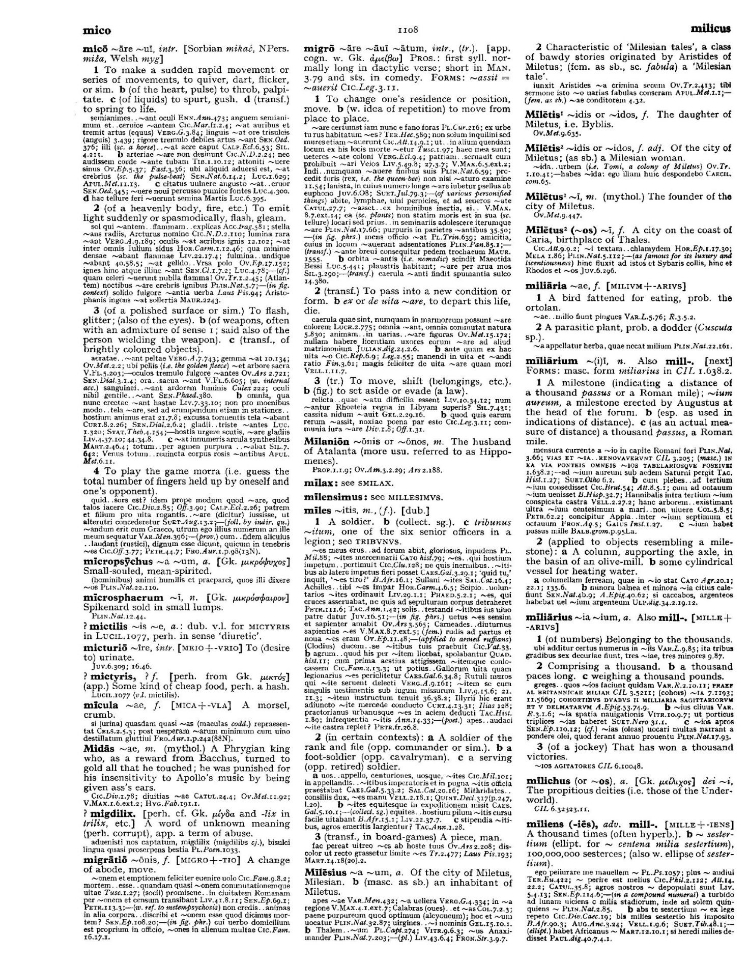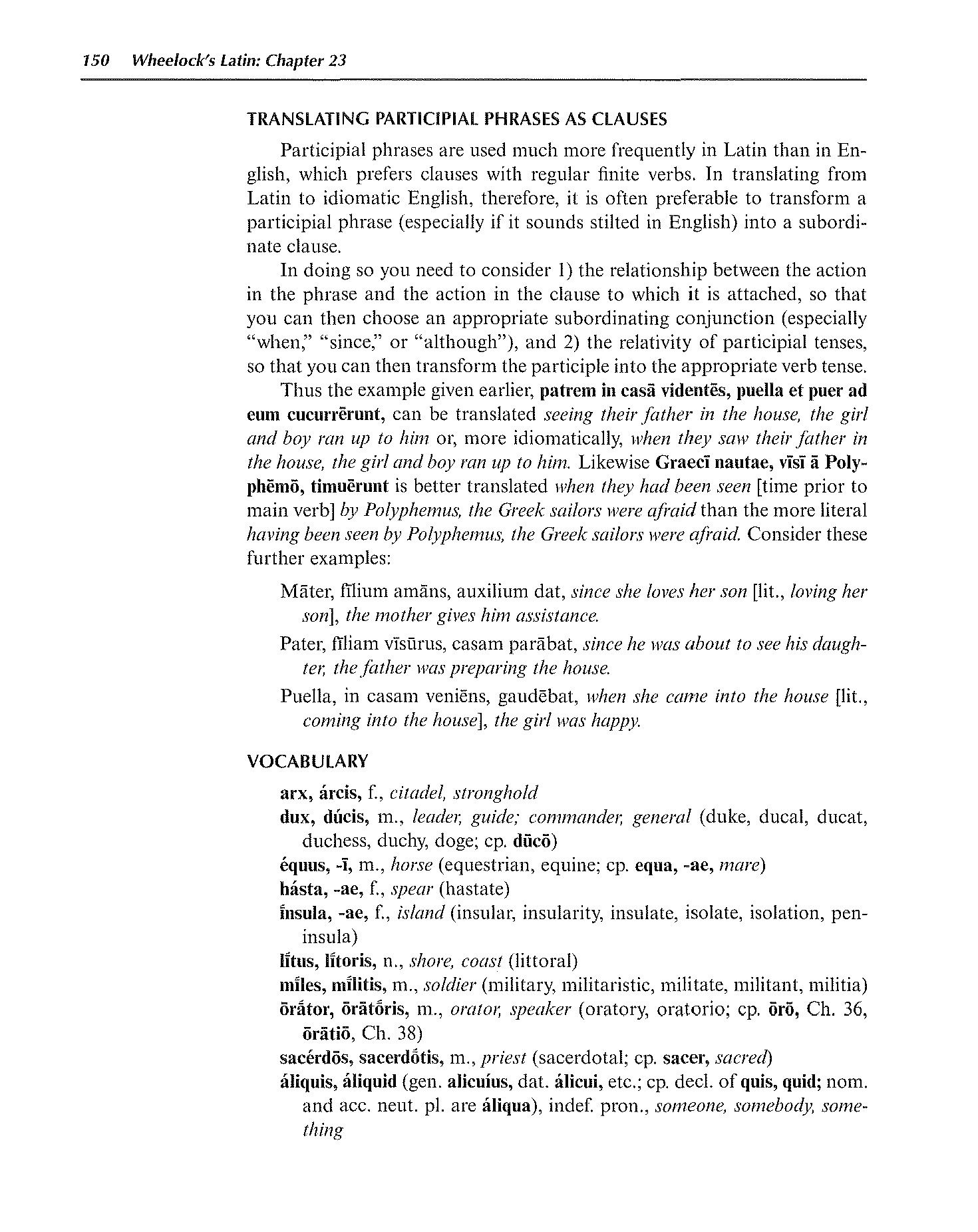
page_listing.tpl
page_subListingDetails.tpl
sub_listingDetails_style1.tpl
sub_listingDetails.title.tpl
mīles soldier
mīles is a Latin Noun that primarily means soldier.
Definitions for mīles
Wheelock's Latin
Noun
- 1
soldier
English derivatives:
military militaristic militate militant militia
Oxford Latin Dictionary
Noun
- 1
A soldier. (b) (collect. sg.). (c) tribunus ~itum, one of the six senior officers in a legion; see TRIBVNVS.
- 2
(in certain contexts): (a) A soldier of the rank and file (opp. commander or sim.). (b) a foot-soldier (opp. cavalryman). (c) a serving (opp. retired) soldier.
- 3
(transf. in board games) A piece, man.
Sentences with mīles
Latin to English
Caesar tam ācer dux erat ut hostēs mīlitēs Rōmānōs nōn vincerent.Compare Caesar was such a keen leader that the enemy did not conquer the Roman soldiers.
Vōbīs dīcēmus cūr mīles hoc fēcerit (faciat).Compare We shall tell you (pl.) why the soldier did (does) this.
Cum in aliam terram proficīscī cōnārētur, ā mīlitibus captus est.Compare When he tried to set out into another land, he was captured by soldiers.
Cum hoc scīret, tamen mīlitēs mīsit.Compare Although he knew this, nevertheless he sent the soldiers.
Miles, omnis immemor difficultas, vado adversus imminens hostis acies.Compare The soldiers, unmindful of all difficulties, advance against the overhanging line of the enemy.
Hibernaculum, res novus miles Romanus, aedifico coepi.Compare Winter tents, a novelty to the Roman soldier, were begun to be built.
Filius is tribunus miles consularis potestas declaror.Compare His son was declared tribune of the soldiers with consular power.
Noster miles fortiter is impetus fero.Compare Our men bravely sustained their charge.
Declension table for mīles
Cactus2000
| Singular | Plural | |
| Nom. | mīles | mīlitēs |
| Gen. | mīlitis | mīlitum |
| Dat. | mīlitī | mīlitibus |
| Acc. | mīlitem | mīlitēs |
| Abl. | mīlite | mīlitibus |
Data sources
Notes
- Definitions
- Frederick M. Wheelock, Wheelock's Latin, 6th ed., rev. Richard A. LaFleur (New York, NY: HarperCollins Publishers, 2005): 150.
- P. G. W. Glare, Oxford Latin Dictionary, Vols. 1-8 (Oxford: Clarendon Press, 1982): 1108.
- Word frequencies
- Christopher Francese, "Latin Core Vocabulary," Dickinson College Commentaries, last modified 2014, http://dcc.dickinson.edu.
- Paul B. Diederich, The Frequency of Latin Words and Their Endings, PhD diss., (Columbia University, 1939).
- Louis Delatte, Suzanne Govaerts, Joseph Denooz, and Etienne Evrard, Dictionnaire fréquentiel et index inverse de la langue latine [Frequency Dictionary and Inverse Index of the Latin Language] (Liège, Belgium: Laboratoire d'analyse statistique des langues anciennes de l'Université de Liège [L.A.S.L.A.], 1981): 119.
Bibliography
Allen, Joseph H. Allen and Greenough's New Latin Grammar for Schools and Colleges: Founded on Comparative Grammar. Edited by James B. Greenough, George L. Kittredge, Albert A. Howard, and Benjamin L. D'Ooge. Boston, MA: Ginn & Company, 1903.
Crystal, David. A Dictionary of Linguistics and Phonetics. 6th ed. Oxford, UK: Blackwell Publishing, 2008.
Delatte, Louis, Suzanne Govaerts, Joseph Denooz, and Etienne Evrard. Dictionnaire fréquentiel et index inverse de la langue latine [Frequency Dictionary and Inverse Index of the Latin Language]. Liège, Belgium: Laboratoire d'analyse statistique des langues anciennes de l'Université de Liège (L.A.S.L.A.), 1981.
Diederich, Paul B. The Frequency of Latin Words and Their Endings. PhD diss., Columbia University, 1939.
Francese, Christopher. "Latin Core Vocabulary." Dickinson College Commentaries. Last modified 2014. http://dcc.dickinson.edu/latin-vocabulary-list.
Gildersleeve, Basil L., and Gonzales Lodge. Gildersleeve's Latin Grammar: Third Edition, Revised, and Enlarged. 3rd ed. London, England: Macmillan and Co., 1903.
Glare, Peter G.W. Oxford Latin Dictionary. Vols. 1-8. Oxford, England: Clarendon Press, 1982.
Krüger, Bernd. "Latin Conjugation Tables." Cactus2000. Accessed May 5, 2023. https://latin.cactus2000.de/index.en.php.
Pierson, Nick. "Sound of Text." Accessed October 26, 2019. https://soundoftext.com.
Wheelock, Frederick M. Wheelock's Latin. 6th ed. Revised by Richard A. LaFleur. New York, NY: HarperCollins Publishers, 2005.
Wiktionary Contributors. "Victionarium." Wikimedia Foundation, Inc. Updated March 18, 2019. https://la.wiktionary.org/wiki/Victionarium:Pagina_prima.
Citation
Chicago (17th ed.)
Allo Contributors. "mīles, mīlitis (n.) - Latin Word Definition." Allo Latin Dictionary. Last modified . Accessed February 20, 2026. http://ancientlanguages.org/latin/dictionary/miles-militis.
Entry created on . Last updated on .







